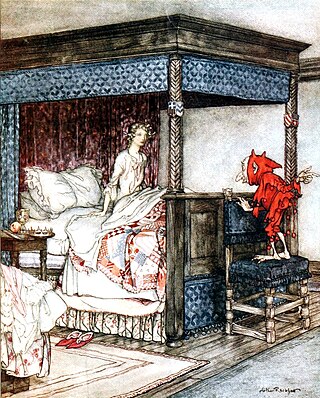Sir Aldingar is an English-language folk song. Francis James Child collected three variants, two fragmentary, in The English and Scottish Popular Ballads. All three recount the tale where a rebuffed Sir Aldingar slanders his mistress, Queen Eleanor, and a miraculous champion saves her.
Willie O Winsbury is a traditional English-language folk ballad. The song, of which there are many variants, is a traditional Scottish ballad that dates from at least 1775, and is known under several other names, including "Johnnie Barbour" and "Lord Thomas of Winesberry".

Billy Blind is an English and Lowland Scottish household spirit, much like a brownie. He appears only in ballads, where he frequently advises the characters. It is possible that the character of Billy Blind is a folk memory of the god Woden or Odin from Germanic mythology, in his "more playful aspect" and is speculated to have been the same character as Blind Harie, the "blind man of the game" in Scotland.
"Hind Etin" is a folk ballad existing in several variants.
The Gay Goshawk is a traditional English-language folk ballad.
Johnie Scot is a traditional English-language folk ballad.
"Rose the Red and White Lily" is Child ballad number 103.
Leesome Brand is an English-language folk song.
The Bent Sae Brown is an English-language folk song.

Fause Foodrage is a Scottish murder ballad of the 17th or 18th century. It was first printed by Walter Scott in Minstrelsy of the Scottish Border (1802). Scott cited Elizabeth, Lady Wardlaw as the ballad's probable author.
Fair Janet is an English-language folk ballad.
Willie and Earl Richard's Daughter is a traditional English-language folk ballad. It recounts the birth of Robin Hood, but is not part of the Robin Hood cycle; Francis James Child rejected the title The Birth of Robin Hood for it on those grounds.
"Willie's Lyke-Wake" is an English-language folk song.
Willie and Lady Maisry, also known as William and Lady Marjorie, is an English-language traditional folk song, likely originating in Scotland. In the liner notes to folk musician Joe Rae's recording of this song, Rod Stradling writes that "Joe believes that the ballad is set in the area around Selkirk—possibly at Thirlstane Castle, in Lauderdale, to the north-east of Selkirk."
"Erlinton" is an English-language folk ballad. One variant features Robin Hood, but this variant forces the folk hero into a ballad structure where he does not fit naturally.
Clerk Saunders is an English-language folk song, likely originating somewhere in England or Scotland. It exists in several variants.
Willie's Fatal Visit is an English-language folk song, most likely originating in Scotland.
"Proud Lady Margaret" is an English-language folk song.
"The King's Dochter Lady Jean", also called "The King's Daughter," "Fair Rosie Ann," or "Queen Jane", is an English-language folk song.
"Eppie Morrie" is one of the Child Ballads, and is of Scottish origin. The author and date are unknown, and as is common with ballads of this type and period, several versions exist. It was printed in James Maidment's anthology A North Country Garland in 1824. That version is reprinted in James Kinsley's The Oxford Book of Ballads, 1969. Although the lyrics were transcribed by Francis James Child, it is uncertain if the original melody has been retained. The earliest recordings are from the performances of Jimmy MacBeath in 1951 and later Ewan MacColl; a more recent version by Andrew Calhoun forms part of his border folk song anthology Telfer's Cows.

